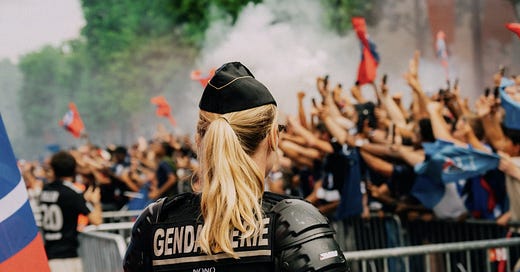France does not have a football violence problem
But it does have a street violence problem, which is largely ignored
If Paris Saint-Germain's Champion League victory last Saturday was a historic event, the violence that marred the celebrations was not. The scenes may have been shocking: two people killed; more than 200 injured, including 29 police officers and firefighters; businesses looted and cars burned across the country.
But none of this came as a big surprise. France's World Cup wins in 1998 and 2018 triggered rejoicing, but also death and destruction. As recently as a month ago, there was unrest after PSG qualified for the Champions League final by beating Arsenal. Ahead of the big day, riots were predicted whatever the outcome. Along the Champ Élysées luxury shops had been boarded up and a large police presence was in evidence.
The most disgraceful aspect of the disturbances, arguably, is that they are not seen as a national disgrace. Le Monde's front-page story on Monday focused on jubilant crowds in Paris, leaving the violence to the back pages. That morning a panel on France Info radio discussed the troubles but agreed that those things happen everywhere. "It's not a French specialty," one commentator said. Another cited incidents during recent victory parades for Napoli and Liverpool FC.
Those parallels are nonsense. Naples is no stranger to football troubles, but the ones sparked by its latest Serie A title were relatively minor. Most of the 40–odd victims suffered fireworks-related injuries. In Liverpool, a suspected drug-impaired driver struck pedestrians. Neither city witnessed assaults on businesses, vehicles or police.
Another evasion consists in blaming the government, always a winning strategy in France. That is, inevitably, the course chosen by opposition parties. The far-right National Rally pointed the finger at Interior Minister Bruno Retailleau. With only 5,400 officers deployed, "Paris was handed over to rioters," its leader said.
On the hard left, La France Insoumise said the use of tear gas had provoked fans. "It's a bloody mess orchestrated by Bruno Retailleau," one LFI lawmaker posted. Whether you think security forces did too little or too much, rioting is viewed as the by-product of bad policing, not the problem itself.
By that logic, the peaceful celebrations in Madrid last year, and in the home city of every Champions League winner before that, are simply proof of the superb crowd-control techniques used by other European police forces – an explanation that conveniently absolves the rioters.
Some have suggested police could have used the same resources as during the 2024 Paris Olympics. If every major sporting event requires tens of thousands of officers to be redeployed from across the country, with huge bonuses paid and leave denied – that should also give pause for thought.
The underlying issue is not a violent fan base. Last Saturday' mayhem began long before the final whistle: those who began smashing shop windows were clearly not following the game closely. A mass gathering provided an opportunity to vent their appetite for destruction and rage at the authorities. One young man interviewed by France Info that night admitted as much: "Police in our estates inflict turbulence on us ("ils nous font vivre des choses turbulentes" is the somewhat poetic phrase he used). That's why I'm going to take revenge tonight."
France does not have a football violence problem, but a street violence problem. Interior Minister Retailleau and many right-wing commentators have blamed "barbarians" for the disturbances. This loaded word is widely understood to refer to youths of immigrant origin deemed responsible for ensauvagement, a perceived civilisation collapse.
Although there is little sign of a general descent into lawlessness – France's homicides rates are markedly down over the past three decades – it is true that the country's bleak banlieues are hotbeds of crime. It's also true that many of those responsible for last weekend's chaos came from those estates. Violence has always been rife among poorer sections of society - which is not a reason for tolerating it, especially as the poor are also the main victims. Better, stricter policing must be part of the answer.
But rioting is not the preserve of banlieue teenagers. For decades farmers, truck-drivers, fishermen and all manner of aggrieved professionals have made their case by ransacking public property. The Champs-Élysées and its luxury shops were targeted during the pension reforms protests in 2023 and the 2018-19 Gilets jaunes movement, spearheaded by older, largely white provincials.
Such violence is always lamented, sometimes even punished. But as I have argued, it is also frequently rewarded. The yellow-vested protesters secured the abandonment of a planned fuel tax, as well as €10 billion in government spending.
France is a country that celebrates a mindless riot as a foundational event. As long as the nation maintains an ambivalent attitude to law and order, ugliness is bound to return to Paris’s beautiful streets.




Good analysis, Henri, deploring a sad reality...